 Petzlover
Petzlover Cardigan Welsh Corgi is originated from United Kingdom but Standard Schnauzer is originated from Germany. Cardigan Welsh Corgi may grow 18 cm / 7 inches shorter than Standard Schnauzer. Cardigan Welsh Corgi may weigh 12 kg / 26 pounds lesser than Standard Schnauzer. Both Cardigan Welsh Corgi and Standard Schnauzer has almost same life span. Cardigan Welsh Corgi may have less litter size than Standard Schnauzer. Cardigan Welsh Corgi requires Low Maintenance. But Standard Schnauzer requires High Maintenance
Cardigan Welsh Corgi is originated from United Kingdom but Standard Schnauzer is originated from Germany. Cardigan Welsh Corgi may grow 18 cm / 7 inches shorter than Standard Schnauzer. Cardigan Welsh Corgi may weigh 12 kg / 26 pounds lesser than Standard Schnauzer. Both Cardigan Welsh Corgi and Standard Schnauzer has almost same life span. Cardigan Welsh Corgi may have less litter size than Standard Schnauzer. Cardigan Welsh Corgi requires Low Maintenance. But Standard Schnauzer requires High Maintenance
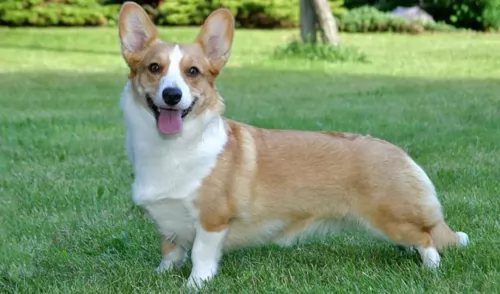 The Cardigan Welsh Corgi, named after Cardiganshire, Wales, is an ancient breed, brought to Wales by the Celts about 3,000 years ago.
The Cardigan Welsh Corgi, named after Cardiganshire, Wales, is an ancient breed, brought to Wales by the Celts about 3,000 years ago.
Small but tough, the Cardigan used to take part in cattle drives and his duties extended to protecting them at night.
The first pair of breeding Cardigans arrived in the United States in June 1931. The AKC granted full recognition to the breed four years later.The Cardi, as the breed is commonly called, was developed as an all-around farm dog in Wales. It is believed to be a descendant of the Pomeranian, Schipperkes, Keeshond and Swedish Valhund.
The Cardigan and the Pembroke Welsh corgis were separated officially into different breeds in the early 1930s. AKC recognition came in 1935.
 Coming out of Germany in the 14th and 15th century is the Standard Schnauzer or Mittelschnauzer. Both the Giant Schnauzer and Miniature Schnauzer are descendants of the Standard Schnauzer. The first name for this breed was the Wire-haired Pinscher until 1879. The breed is a working breed that is popular in Europe and was first in a dog show in 1879 in Hanover, Germany. In 1997 they won Best in Show at the Westminster Kennel Club in New York.
Coming out of Germany in the 14th and 15th century is the Standard Schnauzer or Mittelschnauzer. Both the Giant Schnauzer and Miniature Schnauzer are descendants of the Standard Schnauzer. The first name for this breed was the Wire-haired Pinscher until 1879. The breed is a working breed that is popular in Europe and was first in a dog show in 1879 in Hanover, Germany. In 1997 they won Best in Show at the Westminster Kennel Club in New York.
These medium size Schnauzers were bred in the Middle Ages to be versatile in working and herding in Germany. There seems to be artwork from the 14th through the 16th centuries featuring this breed of dog as a hunter. It is believed that the common ancestors of the Standard Schnauzer is the German Pinscher and the gray Wolf Spitz, along with the black German Poodle and the Bolognese.
It was 1850 when the breed gained recognition as a purebred with distinct and recognizable features. Those are not all the same features that the dogs of today show. These dogs had thick hair on their face, a double coat that is wiry, and their tails were cropped. These dogs were initially Wire-haired German Pinscher then in 1879, a dog named Schnauzer won Best in Show in Hanover. By 1900, the breed was being called Schnauzer everywhere.
The first breed standard was written under the Wire-haired German Pinscher name in the early 1880’s. This standard allowed for a lot of different colors, but the salt and pepper of today was not introduced until the late 1800’s. Then the standard was rewritten in 1907 for the Standard Schnauzer with this as the dominant color.
The first official Standard Schnauzer imported to the United States came in 1905 even though there is a claim that one competed in the 1899 Westminster Kennel Club in the Miscellaneous Class. Following the first World War, the breed became increasingly popular in the States. At that time the US club was called the Wire-haired Pinscher Club of America in 1925. Both standard and miniature sized schnauzer are included in this club.
The breeds were separated in 1933 and became the Standard Schnauzer Club of America and classified by the American Kennel Club as part of the Working Group. In 1926 they moved the Standard Schnauzer to the Terrier Group. By 1926 the Schnauzer Club of Great Britain was formed.
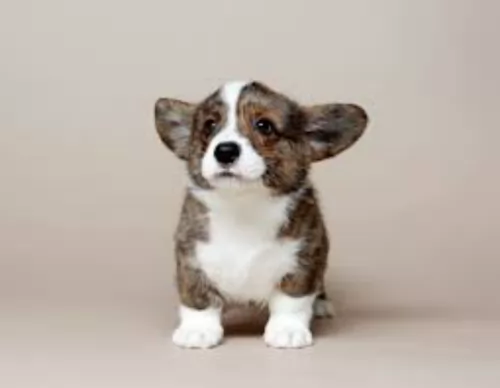 The long-shaped Cardiganshire Welsh Corgi is also nicknamed the ‘yard-long dog’ in Wales. Don’t be fooled by this low-to-the-ground dog, because when you look at him he isn’t a small dog at all, looking almost like a German shepherd with short legs, upright ears and a long, bushy tail.This is unlike the Pembroke Welsh Corgi whose tail is traditionally docked.
The long-shaped Cardiganshire Welsh Corgi is also nicknamed the ‘yard-long dog’ in Wales. Don’t be fooled by this low-to-the-ground dog, because when you look at him he isn’t a small dog at all, looking almost like a German shepherd with short legs, upright ears and a long, bushy tail.This is unlike the Pembroke Welsh Corgi whose tail is traditionally docked.
The Cardi stands around 270 to 330mm tall at the withers and weighs between 11 to 17kg. With those short legs he can gather up quite a speed as well. The dog has a double coat in fawn, red, black and with the outer coat being of medium length and quite harsh to the touch. You can also find some white on the neck, chest as well as on the legs.
The Cardigan Welsh Corgi is full of spirit and makes a fantastic companion for someone looking for a fun-loving, devoted friend. He is an easy going dog, making a wonderful pet, while being reserved with strangers. He isn’t a tall dog but he will guard the family too. He is good with children in the family and even with other pets, provided he is trained and socialized.
 Today’s Standard Schnauzer is a square, robust, medium sized dog. The breed boasts heavy eyebrows and thick beards. They are salt and pepper or black and their coat is wiry and stiff. The breed have excellent muscle tone and a body in proportion height to length. Their build is rugged, and coat is dense.
Today’s Standard Schnauzer is a square, robust, medium sized dog. The breed boasts heavy eyebrows and thick beards. They are salt and pepper or black and their coat is wiry and stiff. The breed have excellent muscle tone and a body in proportion height to length. Their build is rugged, and coat is dense.
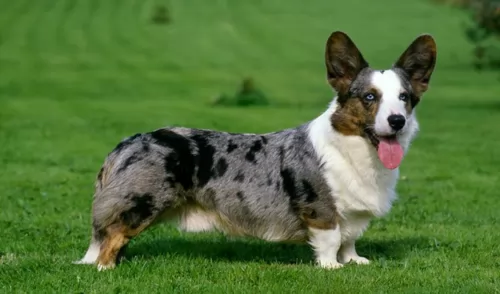 The Cardigan Welsh Corgi is full of surprises and he has been a strong working job, being quick and agile around cattle. He is good at everything and with training and socialization he is going to make an excellent pet.
The Cardigan Welsh Corgi is full of surprises and he has been a strong working job, being quick and agile around cattle. He is good at everything and with training and socialization he is going to make an excellent pet.
They are good with children and other pets and he makes an excellent guard dog as well. He is strong willed and feisty but he wants to please his owner. With a dog like this in your life, you’re going to have a faithful and loving friend who knows how to entertain you as well with his antics.
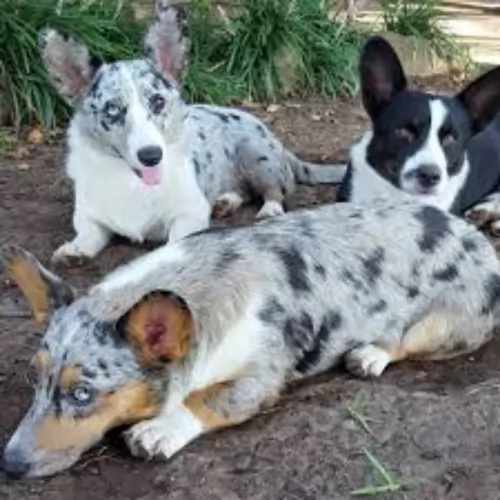 The Cardigan Welsh Corgi is a generally healthy breed with an average lifespan of 12-15 years. Like all dogs, they will have some health concerns, and recognizing the symptoms of some common dog illnesses can spare your pet.
The Cardigan Welsh Corgi is a generally healthy breed with an average lifespan of 12-15 years. Like all dogs, they will have some health concerns, and recognizing the symptoms of some common dog illnesses can spare your pet.
This is a debilitating genetic joint condition that can affects any dog really. It occurs when the hind leg joint isn’t held properly by the hip socket. Bone is worn away and your dog can experience severe pain.
Unfortunately this is a common skeletal disorder and your pet will be reluctant to jump or play. Untreated, it can lead to arthritis and chronic pain, making him immobile. There are several types of treatments and you want to get your pet to the vet to relieve him of pain and discomfort.
This is a terrible disease for your pet because the rear legs can actually become paralyzed and your pet won’t be able to control their bowels. It is an inflammatory autoimmune disease where the dog’s immune system cells attack the spinal cord sheath. If your vet suspects Degenerative Myelopathy, a blood sample will be required. Sometimes the dog has to be mercifully euthanized. Sometimes people even turn to holistic treatments to avoid this and help their pet.
 There are a couple of major hereditary health issues faced by the Standard Schnauzer.
There are a couple of major hereditary health issues faced by the Standard Schnauzer.
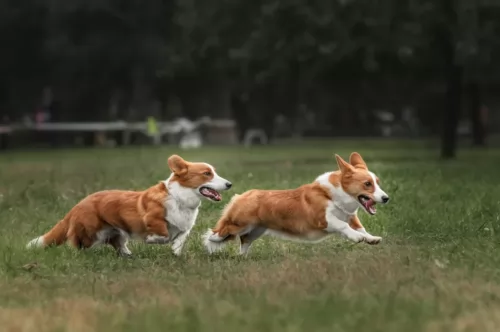 Cardigan Welsh corgis are active dogs and he is going to need daily exercise. He’ll love a walk with you and will show you how agile he is when you throw a ball for him
Cardigan Welsh corgis are active dogs and he is going to need daily exercise. He’ll love a walk with you and will show you how agile he is when you throw a ball for him
The Cardigan is a low maintenance dog. His thick double coat does shed quite a bit but nonetheless it is easy to maintain. Simply give it a good brush to remove loose hairs and to get rid of dirt. This brushing distributes the dogs natural oils and helps to keep the coat shiny and healthy.
 1Feeding the puppy: At 8-12 weeks feed four times a day. At 3 to 6 months feed three times a day. At 6 to 12 months feed twice a day.
1Feeding the puppy: At 8-12 weeks feed four times a day. At 3 to 6 months feed three times a day. At 6 to 12 months feed twice a day.
4. Games and Exercises – The breed is extremely athletic and needs daily exercise. They are playful with dogs and people and they are family dogs. They want to go wherever you go. Hiking, running, jogging and organized activities.
They are great at obedience, agility, flyball, disc dog, herding and tracking. They have also been involved in search and rescue, bomb detection, and cancer detection.